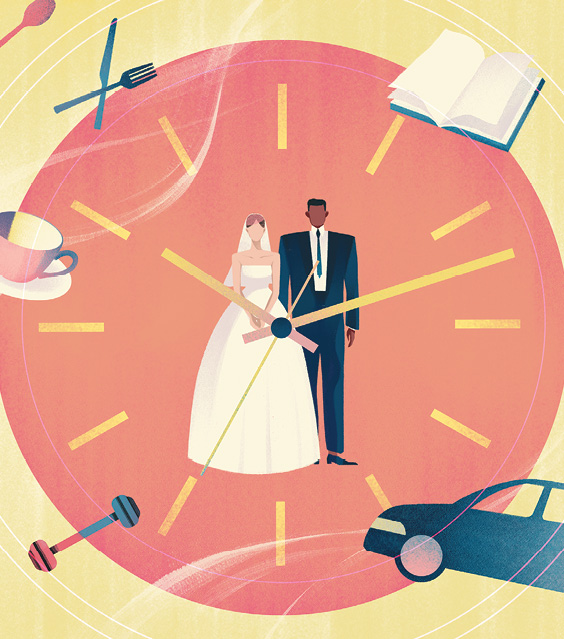“Overall, your essays were good,” my high school freshman-year English teacher told our class. “But there’s one in particular I’d like to read aloud because it really struck me.”
I sat twirling my dark brown curly hair between my thumb and index finger, missing the long ringlet that had just been chopped off. I felt physically heavy from the sadness. The stylist wasn’t listening when I asked him to just take a bit off, and now my head was encased in a frizzy, floofy ball of hair.
It took all of my energy to even show up to first period. I remember wanting to sit at home all day and wallow—about my horrible short hair, my seemingly never-ending journey with braces, the Coke-bottle glasses I’d worn since I was 2, and the persistent feeling that I didn’t fit in my 14-year-old body.
Mrs. Koc began reading from one of our essays about Ray Bradbury’s Dandelion Wine. After hearing a few words, I sat up a bit straighter and cocked my head slightly upward. She was reading my essay. I suddenly felt lighter.
After class, she pulled me aside and asked me whether I’d ever thought about becoming a writer. I hadn’t. I read voraciously—two or three books a week since I was 10 years old—but never considered writing. She suggested I speak with the teacher in charge of our school newspaper, and I did.
***
My friend Julie and I had just gotten off of the Metra commuter train at Union Station in Chicago. It was cold for September—even in Chicago—so we were bundled in jackets and colorful scarves. We took the train from our suburban hometown, Northbrook, to see a Sister Hazel concert at the House of Blues.
Just as we walked off of the escalator that led up to the street-level exit, I got a call from my mom. A call I’d been waiting for. I headed to the Corner Bakery on my right and spun into a seat.
At that point, it’d been more than a year since I’d started having all sorts of concerning medical issues: anemia, constant trips to the bathroom, malnutrition. We’d had what felt like endless appointments with a series of very confused doctors, and one gastroenterologist thought he might have finally figured out what was wrong with me. He suspected I had something called celiac disease, an autoimmune disease in which the body rejects gluten.
It was 2006, back when the term gluten free hadn’t yet infiltrated mainstream culture. I was 16 and feared a future without gigantic Chipotle burritos, subtly sweet peach crepes and salty soft pretzels. More than anything, I just wanted to know for sure what was wrong with me.
I had an endoscopy done a few days before, and the doctor said he was fairly certain I had the disease. The call would simply be to confirm the biopsy results.
“The doctor called,” my mom said. “You have celiac disease. I’m so sorry.”
***
We had just finished stuffing ourselves at a seafood restaurant on the Greek island of Santorini. The sun set, and the dark sky was filled with the faintest navy hue. My stomach was full of rice-stuffed tomatoes and feta cheese soaked in oregano and olive oil, but it was too early to go back to the hotel.
 As we walked along the cobblestone streets, past the white stucco jewelry shops and leather shoe stores, my husband, David, and I came upon a dessert spot. Neither of us eats sweets often, especially in the months we prepared for our wedding (and wedding photos). But this was our honeymoon. What’s a few extra calories?
As we walked along the cobblestone streets, past the white stucco jewelry shops and leather shoe stores, my husband, David, and I came upon a dessert spot. Neither of us eats sweets often, especially in the months we prepared for our wedding (and wedding photos). But this was our honeymoon. What’s a few extra calories?
A server took us up a winding staircase to the restaurant’s upstairs patio. It was slightly breezy, about 60 degrees, but still nice. David put his arm around my shoulder when he saw the goose bumps on my arms.
We sidled into the same side of the booth on the rooftop patio. We were the only people there. I ordered a double scoop of vanilla gelato with chocolate and caramel sauce, and a latte. I ate the whole thing (with a little help from David).
We weren’t diving off cliffs or exploring the island’s ancient architecture. We were sharing coffee, dessert and warmth on a tiny rooftop restaurant overlooking the Mediterranean Sea. For an instant, though, it felt like we might be the only two people on the island.
***
These are all tiny moments—five or 10 minutes in a lifetime of thousands—that have stuck with me and shaped my life. One set me on my current career path. Another set me on the road to better health. And another is just one moment of hundreds that has shaped my relationship with my husband.
Our lives are full of moments like these. They’re structured (weddings, birthdays, graduations) and unstructured—tiny memories we pull out of life that never leave us: singing “Itsy Bitsy Spider” to my niece in the cornfields of Indiana, thrashing about as a sweaty 15-year-old at a punk show in Chicago with my best friend. I’ve been thinking about these moments a lot lately.
Brothers Chip and Dan Heath have written an entire book about the subject, exploring what they call defining moments. In the book, The Power of Moments: Why Certain Experiences Have Extraordinary Impact, the Heath brothers divide defining moments into four categories: moments of elevation (celebrations and milestones); moments of insight (realizations and transformations); moments of pride (achievements and recognitions); and moments of connection (bonds with others).
The Heath brothers are both highly accomplished academics. Chip is a professor at Stanford University’s Graduate School of Business and holds a Ph.D. in psychology from Stanford. Dan is a senior fellow at Duke University’s Center for the Advancement of Social Entrepreneurship and received his MBA from Harvard Business School. They have written three best-selling books together: Made to Stick, Switch and Decisive, all of which have become very popular.
The brothers argue—through research studies and both business and personal anecdotes—that although we think most defining moments in our lives are spontaneous, we can actually create them ourselves. We don’t have to wait for them to come along. And by creating them, we can foster a stronger sense of meaning, joy and happiness in ourselves and those around us.
The book grabbed my attention because, just married and nearing 30 years old, I’d been grappling with the worry that many of the biggest moments of my life were behind me—that my life was slipping into the clutches of routine and monotony. Almost every Friday night, David and I ate at the same restaurant, Kenny’s Italian Kitchen, and then went to see a movie. At home, we cooked the same meal of salmon with rice and spinach at least twice a week. I was happy. Life just felt like more of a routine each passing week.
First some background: The last few years of my life have been rife with exciting moments. Most of them fit into the “elevation” category. Within a two-year stretch, I got my master’s degree, got a job, got engaged and got married. My husband became a doctor, my grandma turned 90, my best friend got married, my niece was born, and my mom retired. Our family didn’t have more than a two- or three-month stretch without something to celebrate. I reveled in the constant joy—the excuses to get dressed up, take copious photos, have a bit too much to drink and indulge in delicious food.
Related: The Most Important Lessons My Grandma Taught Me
The biggest of these moments—at least in terms of planning and preparation—happened six months ago, when I got married. My husband and I dated for nearly eight years, so the day was a long time coming. We met when we were 19 and in college. We matured together, moved across the country together and finally, decided we would spend the rest of our lives taking risks and exploring together. It felt like the highest peak in a long journey full of them.

JASU HU
Our wedding day was all smiles, laughter, joy and splendor. Everyone we loved was in one room for one night celebrating our future with us. It was pure happiness. The weeks following were riddled with post-marital bliss, too, like residual joy radiating from that wonderful moment. We’d regularly look at photos and watch our wedding video, basking in the glow of that day. After the excitement and joy settled, though, something peculiar happened. I thought about the upcoming few years and realized there were no big moments on the horizon. Nothing big to plan. Nothing we’d remember. Nothing to look forward to except a banal daily routine swallowing whole weeks and months of our lives: Wake up, skip breakfast, go to work, eat lunch, take a barre class, eat dinner, watch a new show on Netflix, go to bed early, repeat. The vision filled me with anxiety.
I wanted to know we still had big years to come. A nagging thought kept popping up, working its way through my mind. More and more I wondered: Is all of the excitement behind us?
***
First I turned to the book. In The Power of Moments, the Heath brothers write about a research study in which people were asked to predict what the most important events would be in a newly born infant’s life. The most common answers were, in order:
1. Having children
2. Marriage
3. Begin school
4. College
5. Fall in love
6. Others’ death
7. Retirement
8. Leave home
9. Parents’ deaths
10. First job
What Chip and Dan Heath realized was that at least half of these events happen before the age of 30. And in a study in which elderly people were asked to talk about their most vivid memories, most recalled moments during this same time frame.
There’s this phenomenon called the reminiscence bump. It’s the idea that novelty actually makes time feel slower. “Surprise stretches time,” Chip and Dan write. When we’re constantly having new experiences—like traveling or celebrating a big first-time accomplishment—time actually seems to move at a different pace. We remember a higher percentage of each hour.
“This is the intuitive explanation for the common perception that time seems to accelerate as we get older,” they write. “Our lives become more routine and less novel.”
My husband and I are 27 and 28, at the tail end of this time frame. I’ve come to crave the excitement of celebrations and momentous occasions—the anticipation of knowing that a day or event in the near future would be one I remembered for the rest of my life. I worried I’d lose this ability to slow down time.
I found the answer to this worry in the section of the book where the brothers write about how our lives are “scripts,” and how we need to break the scripts more often.
“For those anxious about facing a future that’s less memorable than the past, our advice is to honor the old saw, ‘Variety is the spice of life,’ ” Chip and Dan write. “But notice that it does not say ‘Variety is the entrée of life.’ Nobody dines on pepper and oregano. A little novelty can go a long way. Learn to recognize your own scripts. Play with them, poke at them, disrupt them.”
I realized my anxiety was coming from the expectation that joyous occasions just happen. I never thought of creating them myself.
“Defining moments shape our lives, but we don’t have to wait for them to happen,” they write in The Power of Moments. “We can be the authors of them.”
***
I decided to call the brothers. I spoke with Chip about feeling like all of my life’s defining moments were behind me and as though I had nothing to look forward to. He said it made sense, considering my age.
“If you ask people what memorable moments are in their lifetime, they often list things that happened in their 20s,” he said. “Going to college, getting a degree, graduation ceremonies, weddings, starting a career. And the trick, if you want to make life interesting past that, is to think about what the milestones are that you can set up for yourself.”
The key is to be more intentional about our meaningful moments, because once the big ones pass us by, we have to be deliberate. The “created” moments can be big—like a two-week vacation with your spouse or getting published in the magazine of your dreams—or small and simple. Chip gives me an idea.
He tells me about a research study that followed two groups of couples for six to 10 weeks. One group went on a date every weekend but did the same things they’d normally do. The other group of couples still went on weekend dates but tried something new each week. The changes were subtle. For example, instead of eating burgers, they’d try cooking a new recipe at home. Or instead of seeing a horror film, they’d see an indie documentary.
“It turns out that people who have done something different every week express more closeness,” Chip said.
Chip encouraged me to think on a similarly small scale in terms of defining moments. “I don’t think it has to be as dramatic as going on a big vacation,” he said. “Going for Vietnamese when you’re used to eating Italian provides interesting conversation. You’ve bonded with somebody over a new experience.”
I began thinking of ways to incorporate his suggestions into my life and came up with a plan.
***
My husband’s time off this year is sporadic because he’s a medical resident, but I found a recent Saturday when I knew he was free. I planned a day full of surprises, mainly things we hadn’t done before.
In the morning, we kayaked on White Rock Lake in Dallas. The light gray sky looked like it might burst into a deluge at any minute, but for the hour we paddled, we were spared the downpour. (And when I say we paddled, I mean my husband paddled and I took a stream of photos and videos we’ll look at for years to come.) We squirmed as the cold, murky water filled our shorts, and talked about how we’d need to purchase new hiking shoes for next year’s trip to Costa Rica.

JASU HU
For lunch, we went to a small, hole-in-the-wall sushi spot attached to a Japanese grocery store. This wasn’t entirely new—we’d been there before. But we don’t go often, and I knew my husband loved it. We ordered way more food than we should have and somehow managed to finish it all over conversation about our jobs and glasses of hot green tea.
For dinner, we took a Barcelona-themed cooking class at a local cooking school. We made seafood paella, prosciutto-wrapped asparagus and steaks. We love to travel, and the first big trip we ever took together was to Spain five years earlier.
As I write this, the day of surprises is over a month in the past, but there are so many small moments I still remember clearly. We laughed about my fingers turning purple from gripping the kayak paddles too hard. My husband tried (and failed) to get me to finally try raw fish. We smirked as we snuck bites of shrimp and calamari from the paella pan when no one in the cooking class was looking.
Will I remember the details of this day in five, 10 or 20 years? I’m not sure. But I do know that it broke up the monotony of routine during a busy and trying few months, and motivated me to break the script, as Chip and Dan say, more often.
Instead of going to Kenny’s Italian and out for a movie every Friday night, we now try new places. Last week we went to a new pho restaurant, and the week before that we tried a new Thai spot and then went out after for Arabic ice cream, something neither of us had ever had. Instead of walking in the same forest preserve in Plano, Texas, every Sunday morning, we’ve found a new spot to explore nearly every weekend for the last few months.
Breaking the routine seems so simple, but it had never crossed my mind. Part of what we seek in life is stability. Sometimes, I look forward to a comfy night of Netflix binging. But even the small break in routine of eating at a new restaurant on Friday night has made our lives more enjoyable and adventurous. I feel closer to my husband, as Chip predicted.
Trying new things has extended beyond our marriage, too. When my family visited us in Dallas recently, we went to a new art exhibit instead of shopping at the mall like we normally do. And a few weeks ago, I went to the Lantern Fest with a group of friends. We drove to a large field in Ennis, Texas, and joined thousands of people in simultaneously lighting paper lanterns and releasing them into the night sky.
Now, when I think of the future, I’m not worried about the years between momentous celebrations or milestone birthday parties. Because I know those stretches won’t be filled with monotony or boredom. They’ll be filled with as many memorable moments as we can possibly pack in.
Related: How to Create a Life of Significance
This article originally appeared in the March 2018 issue of SUCCESS magazine.









